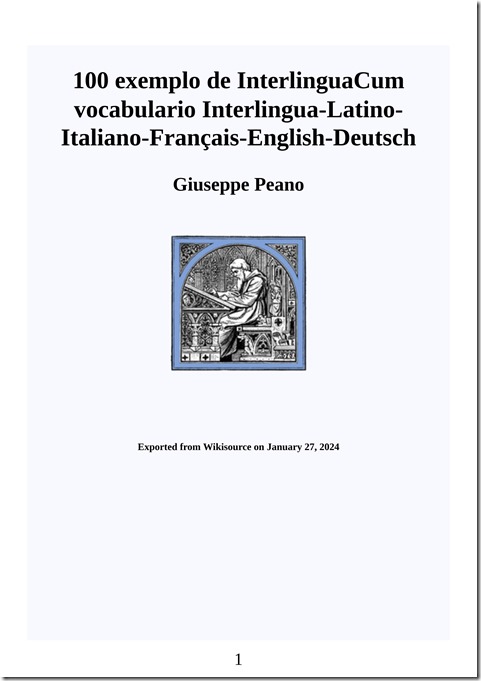Please note this!
First of all, if you are interested in Latino sine flexione, read the Wikipedia article on sine flexione in English. From there, you get everything in a nutshell. Here, I am studying details and have no opportunity to explain everything from head to foot each time.
100 exemplo de Interlingua –booklet
I have found the links to download the Booklet in many forms; see the table below.
|
100 Exemplo de Interlingua from Wikisource |
|
|
Printable version |
|
|
PDF version |
|
|
EPUB version |
|
100 exemplo de interlingua 21 – 33
|
Latino sine flexione |
Latina |
English |
|
|
21 |
Occasione fac fur. |
Occasio facit furem. |
Opportunity makes a thief. |
|
22 |
Nocte fer consilio. |
In nocte consilium. |
La nuit porte conseil (Fr) = Sleep on it! |
|
23 |
Exceptione proba regula. |
Exceptio probat regulam. |
The exception proves the rule. |
|
24 |
Nocte seque die. |
Nox sequitur diem. |
Night follows day. |
|
25 |
Ver seque hieme. |
Sequitur ver hiemem |
Spring follows winter |
|
26 |
Fine corona opere. |
Finis coronat opus. |
The end crowns the work. |
|
27 |
Qui vol, pote. |
Qui vult, potest. |
Whoever wants, they can. |
|
I don’t know why Peano drops the last vocal away from some Using the other Interlingua the sentence goes: Qui vole, pote. |
|||
|
28 |
Qui tace, consenti. |
Qui tacet consentit |
He who is silent consents. |
|
29 |
Qui doce, disce. |
Docendo discimus. |
He who teaches, learns. |
|
30. |
Divide et impera. |
Divide et impera! |
Divide and rule! |
|
31 |
In dubio, abstine. |
In dubio, abstine! |
Meaning: |
|
32 |
Re vario delecta. — Varietate delecta. |
Varietas delectat. |
Variety delights. |
|
33 |
Omni re muta, nullo more. |
Omnia mutantur, nihil interit. |
Everything changes, nothing disappears. |
|
Even though in ”100 exemplo de Interlingua” |
|||

